Detailed Analysis of Sleep Wake Disorder: Case Study Report
VerifiedAdded on 2022/09/13
|8
|2278
|12
Report
AI Summary
This report provides a comprehensive analysis of sleep wake disorders, focusing on a case study involving a 39-year-old consultant named Sarah. It defines sleep wake disorders as disruptions in the body's internal clock, leading to issues like insomnia and hypersomnia, and explores the disorder's symptoms, including difficulty sleeping, poor concentration, and mood swings. The report delves into potential causes such as stress, anxiety, and biological factors, as well as available treatments like light therapy, behavioral counseling, medication, and lifestyle adjustments. It also provides a historical and global perspective on the disorder, highlighting the importance of addressing sleep problems due to their impact on cognitive skills and overall well-being. The report references various studies and classifications, offering a detailed understanding of the condition and its management.
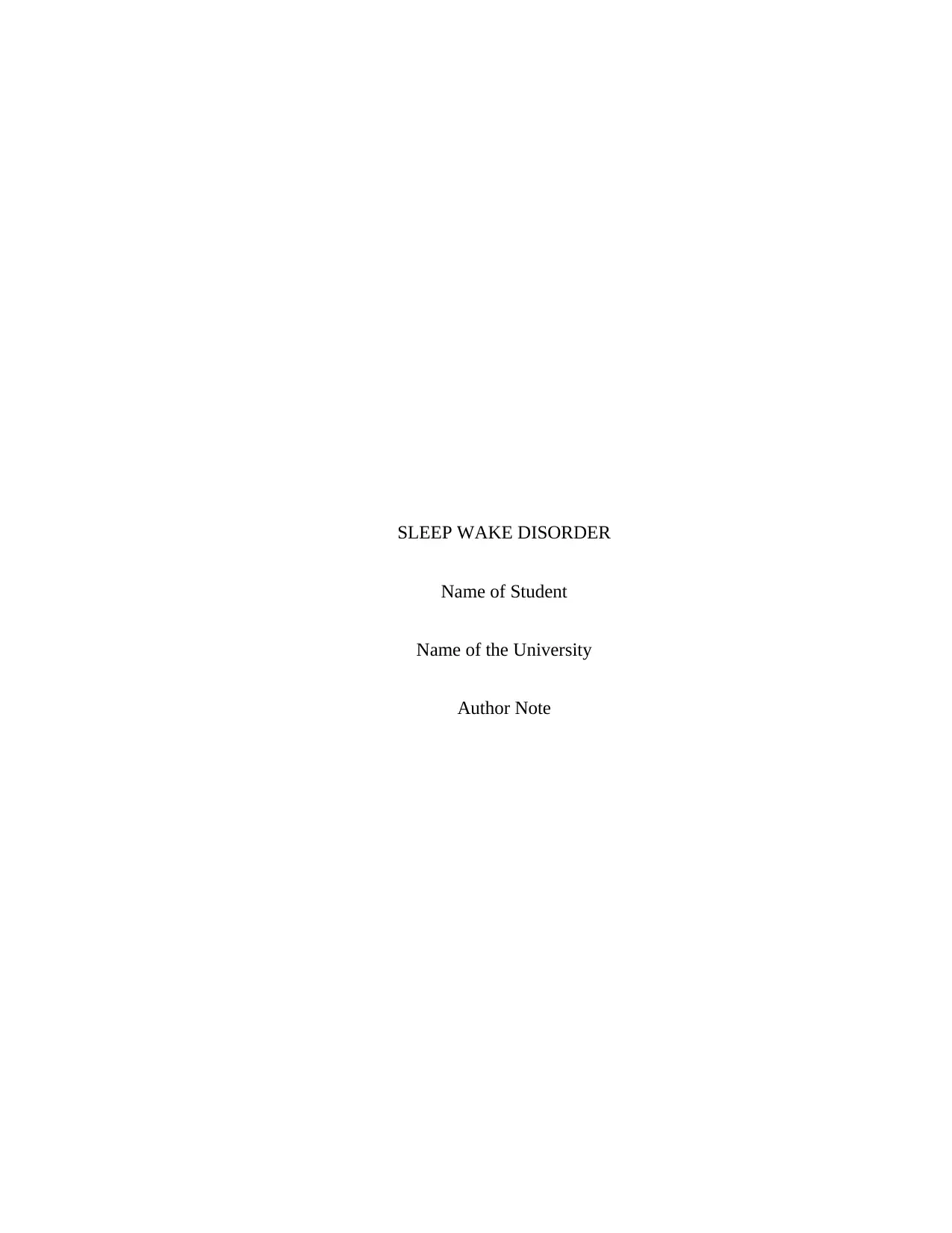
SLEEP WAKE DISORDER
Name of Student
Name of the University
Author Note
Name of Student
Name of the University
Author Note
Paraphrase This Document
Need a fresh take? Get an instant paraphrase of this document with our AI Paraphraser
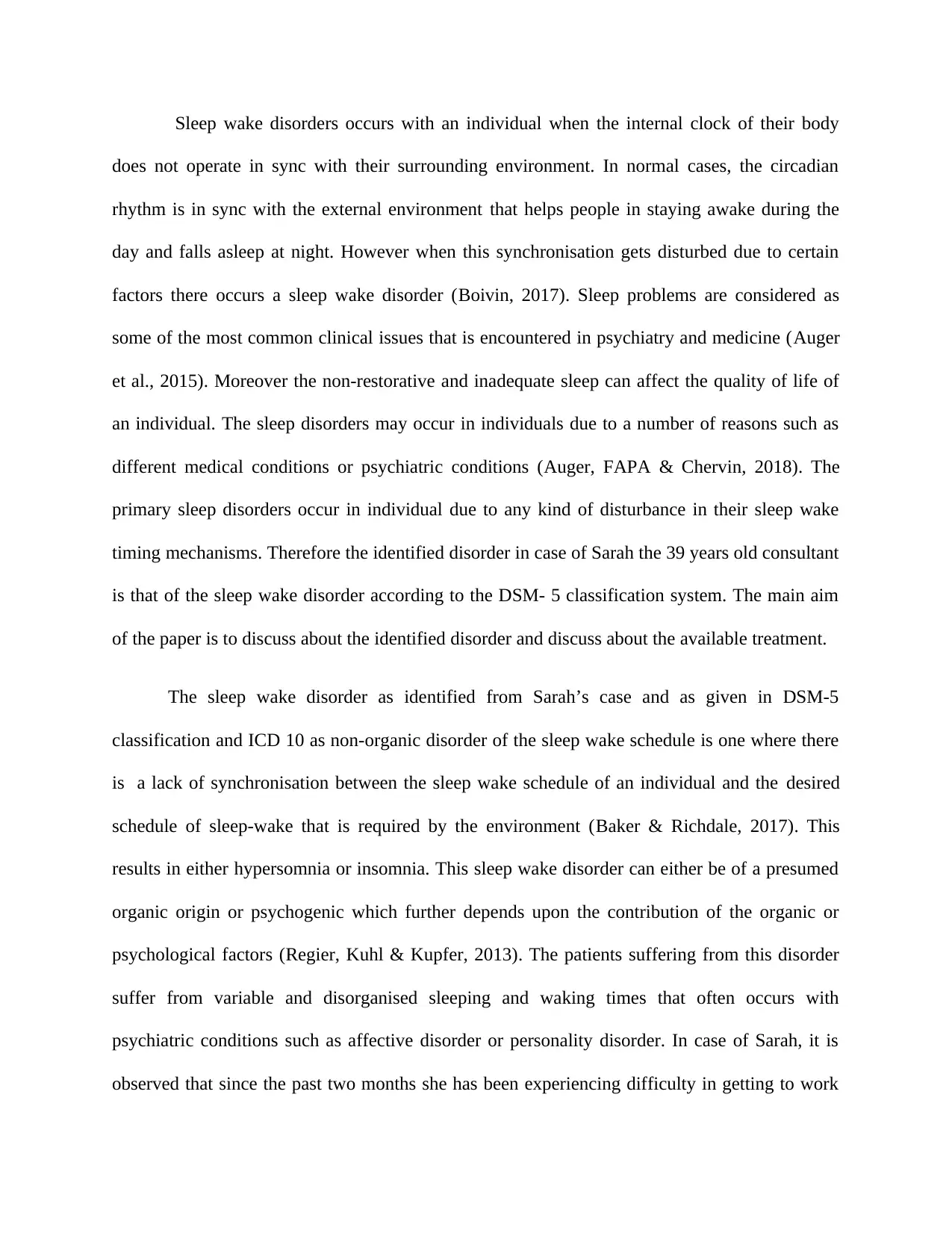
Sleep wake disorders occurs with an individual when the internal clock of their body
does not operate in sync with their surrounding environment. In normal cases, the circadian
rhythm is in sync with the external environment that helps people in staying awake during the
day and falls asleep at night. However when this synchronisation gets disturbed due to certain
factors there occurs a sleep wake disorder (Boivin, 2017). Sleep problems are considered as
some of the most common clinical issues that is encountered in psychiatry and medicine (Auger
et al., 2015). Moreover the non-restorative and inadequate sleep can affect the quality of life of
an individual. The sleep disorders may occur in individuals due to a number of reasons such as
different medical conditions or psychiatric conditions (Auger, FAPA & Chervin, 2018). The
primary sleep disorders occur in individual due to any kind of disturbance in their sleep wake
timing mechanisms. Therefore the identified disorder in case of Sarah the 39 years old consultant
is that of the sleep wake disorder according to the DSM- 5 classification system. The main aim
of the paper is to discuss about the identified disorder and discuss about the available treatment.
The sleep wake disorder as identified from Sarah’s case and as given in DSM-5
classification and ICD 10 as non-organic disorder of the sleep wake schedule is one where there
is a lack of synchronisation between the sleep wake schedule of an individual and the desired
schedule of sleep-wake that is required by the environment (Baker & Richdale, 2017). This
results in either hypersomnia or insomnia. This sleep wake disorder can either be of a presumed
organic origin or psychogenic which further depends upon the contribution of the organic or
psychological factors (Regier, Kuhl & Kupfer, 2013). The patients suffering from this disorder
suffer from variable and disorganised sleeping and waking times that often occurs with
psychiatric conditions such as affective disorder or personality disorder. In case of Sarah, it is
observed that since the past two months she has been experiencing difficulty in getting to work
does not operate in sync with their surrounding environment. In normal cases, the circadian
rhythm is in sync with the external environment that helps people in staying awake during the
day and falls asleep at night. However when this synchronisation gets disturbed due to certain
factors there occurs a sleep wake disorder (Boivin, 2017). Sleep problems are considered as
some of the most common clinical issues that is encountered in psychiatry and medicine (Auger
et al., 2015). Moreover the non-restorative and inadequate sleep can affect the quality of life of
an individual. The sleep disorders may occur in individuals due to a number of reasons such as
different medical conditions or psychiatric conditions (Auger, FAPA & Chervin, 2018). The
primary sleep disorders occur in individual due to any kind of disturbance in their sleep wake
timing mechanisms. Therefore the identified disorder in case of Sarah the 39 years old consultant
is that of the sleep wake disorder according to the DSM- 5 classification system. The main aim
of the paper is to discuss about the identified disorder and discuss about the available treatment.
The sleep wake disorder as identified from Sarah’s case and as given in DSM-5
classification and ICD 10 as non-organic disorder of the sleep wake schedule is one where there
is a lack of synchronisation between the sleep wake schedule of an individual and the desired
schedule of sleep-wake that is required by the environment (Baker & Richdale, 2017). This
results in either hypersomnia or insomnia. This sleep wake disorder can either be of a presumed
organic origin or psychogenic which further depends upon the contribution of the organic or
psychological factors (Regier, Kuhl & Kupfer, 2013). The patients suffering from this disorder
suffer from variable and disorganised sleeping and waking times that often occurs with
psychiatric conditions such as affective disorder or personality disorder. In case of Sarah, it is
observed that since the past two months she has been experiencing difficulty in getting to work
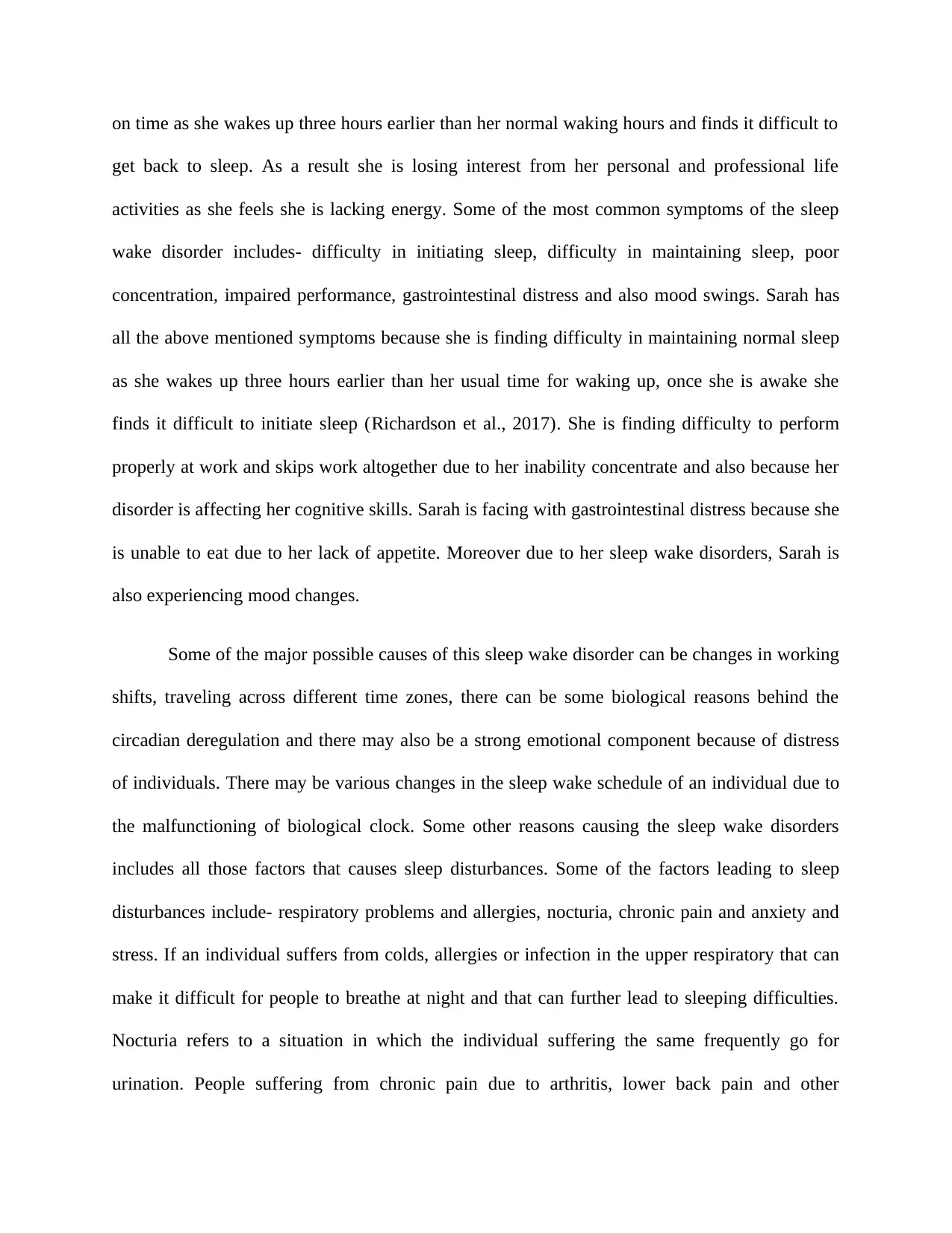
on time as she wakes up three hours earlier than her normal waking hours and finds it difficult to
get back to sleep. As a result she is losing interest from her personal and professional life
activities as she feels she is lacking energy. Some of the most common symptoms of the sleep
wake disorder includes- difficulty in initiating sleep, difficulty in maintaining sleep, poor
concentration, impaired performance, gastrointestinal distress and also mood swings. Sarah has
all the above mentioned symptoms because she is finding difficulty in maintaining normal sleep
as she wakes up three hours earlier than her usual time for waking up, once she is awake she
finds it difficult to initiate sleep (Richardson et al., 2017). She is finding difficulty to perform
properly at work and skips work altogether due to her inability concentrate and also because her
disorder is affecting her cognitive skills. Sarah is facing with gastrointestinal distress because she
is unable to eat due to her lack of appetite. Moreover due to her sleep wake disorders, Sarah is
also experiencing mood changes.
Some of the major possible causes of this sleep wake disorder can be changes in working
shifts, traveling across different time zones, there can be some biological reasons behind the
circadian deregulation and there may also be a strong emotional component because of distress
of individuals. There may be various changes in the sleep wake schedule of an individual due to
the malfunctioning of biological clock. Some other reasons causing the sleep wake disorders
includes all those factors that causes sleep disturbances. Some of the factors leading to sleep
disturbances include- respiratory problems and allergies, nocturia, chronic pain and anxiety and
stress. If an individual suffers from colds, allergies or infection in the upper respiratory that can
make it difficult for people to breathe at night and that can further lead to sleeping difficulties.
Nocturia refers to a situation in which the individual suffering the same frequently go for
urination. People suffering from chronic pain due to arthritis, lower back pain and other
get back to sleep. As a result she is losing interest from her personal and professional life
activities as she feels she is lacking energy. Some of the most common symptoms of the sleep
wake disorder includes- difficulty in initiating sleep, difficulty in maintaining sleep, poor
concentration, impaired performance, gastrointestinal distress and also mood swings. Sarah has
all the above mentioned symptoms because she is finding difficulty in maintaining normal sleep
as she wakes up three hours earlier than her usual time for waking up, once she is awake she
finds it difficult to initiate sleep (Richardson et al., 2017). She is finding difficulty to perform
properly at work and skips work altogether due to her inability concentrate and also because her
disorder is affecting her cognitive skills. Sarah is facing with gastrointestinal distress because she
is unable to eat due to her lack of appetite. Moreover due to her sleep wake disorders, Sarah is
also experiencing mood changes.
Some of the major possible causes of this sleep wake disorder can be changes in working
shifts, traveling across different time zones, there can be some biological reasons behind the
circadian deregulation and there may also be a strong emotional component because of distress
of individuals. There may be various changes in the sleep wake schedule of an individual due to
the malfunctioning of biological clock. Some other reasons causing the sleep wake disorders
includes all those factors that causes sleep disturbances. Some of the factors leading to sleep
disturbances include- respiratory problems and allergies, nocturia, chronic pain and anxiety and
stress. If an individual suffers from colds, allergies or infection in the upper respiratory that can
make it difficult for people to breathe at night and that can further lead to sleeping difficulties.
Nocturia refers to a situation in which the individual suffering the same frequently go for
urination. People suffering from chronic pain due to arthritis, lower back pain and other
⊘ This is a preview!⊘
Do you want full access?
Subscribe today to unlock all pages.

Trusted by 1+ million students worldwide
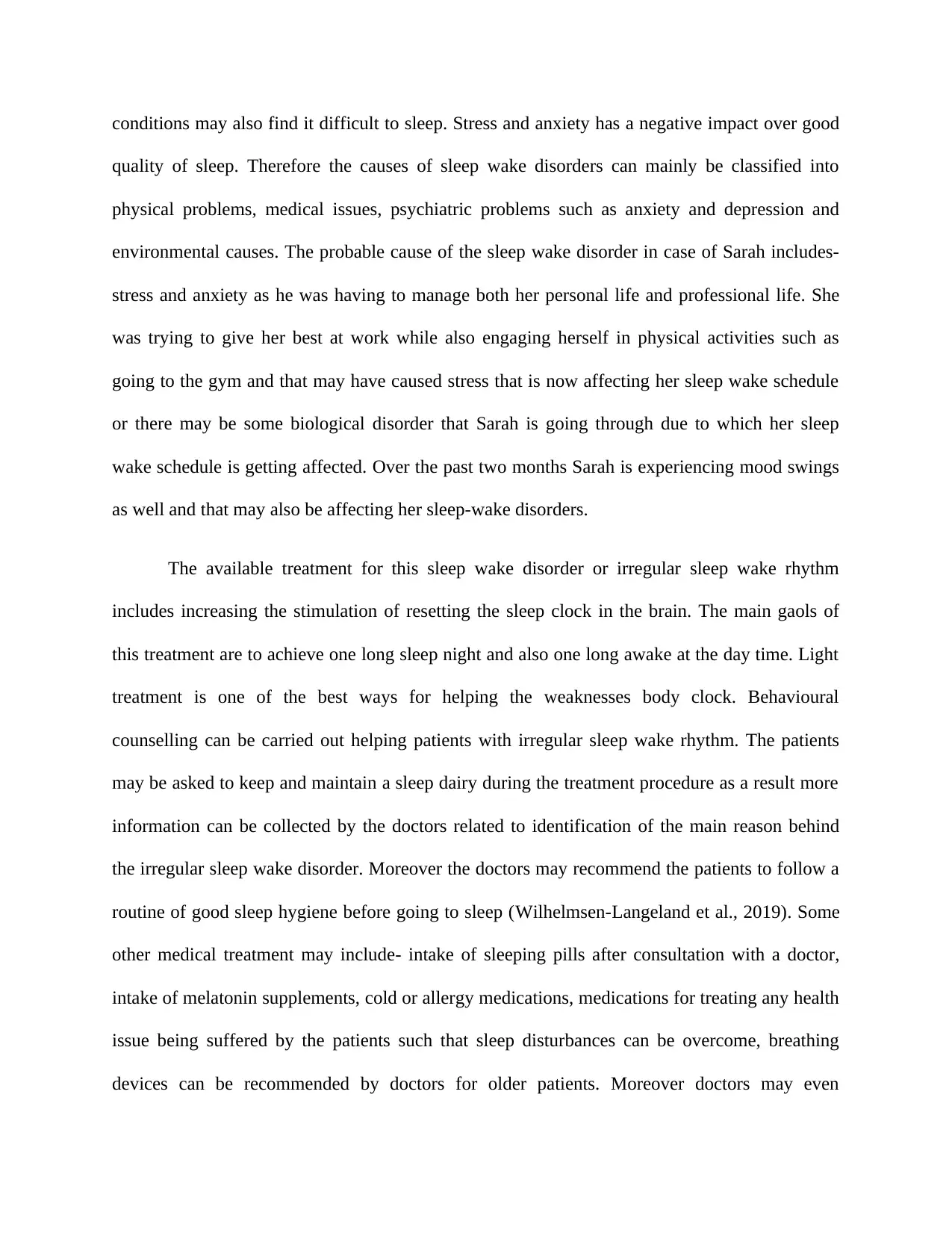
conditions may also find it difficult to sleep. Stress and anxiety has a negative impact over good
quality of sleep. Therefore the causes of sleep wake disorders can mainly be classified into
physical problems, medical issues, psychiatric problems such as anxiety and depression and
environmental causes. The probable cause of the sleep wake disorder in case of Sarah includes-
stress and anxiety as he was having to manage both her personal life and professional life. She
was trying to give her best at work while also engaging herself in physical activities such as
going to the gym and that may have caused stress that is now affecting her sleep wake schedule
or there may be some biological disorder that Sarah is going through due to which her sleep
wake schedule is getting affected. Over the past two months Sarah is experiencing mood swings
as well and that may also be affecting her sleep-wake disorders.
The available treatment for this sleep wake disorder or irregular sleep wake rhythm
includes increasing the stimulation of resetting the sleep clock in the brain. The main gaols of
this treatment are to achieve one long sleep night and also one long awake at the day time. Light
treatment is one of the best ways for helping the weaknesses body clock. Behavioural
counselling can be carried out helping patients with irregular sleep wake rhythm. The patients
may be asked to keep and maintain a sleep dairy during the treatment procedure as a result more
information can be collected by the doctors related to identification of the main reason behind
the irregular sleep wake disorder. Moreover the doctors may recommend the patients to follow a
routine of good sleep hygiene before going to sleep (Wilhelmsen-Langeland et al., 2019). Some
other medical treatment may include- intake of sleeping pills after consultation with a doctor,
intake of melatonin supplements, cold or allergy medications, medications for treating any health
issue being suffered by the patients such that sleep disturbances can be overcome, breathing
devices can be recommended by doctors for older patients. Moreover doctors may even
quality of sleep. Therefore the causes of sleep wake disorders can mainly be classified into
physical problems, medical issues, psychiatric problems such as anxiety and depression and
environmental causes. The probable cause of the sleep wake disorder in case of Sarah includes-
stress and anxiety as he was having to manage both her personal life and professional life. She
was trying to give her best at work while also engaging herself in physical activities such as
going to the gym and that may have caused stress that is now affecting her sleep wake schedule
or there may be some biological disorder that Sarah is going through due to which her sleep
wake schedule is getting affected. Over the past two months Sarah is experiencing mood swings
as well and that may also be affecting her sleep-wake disorders.
The available treatment for this sleep wake disorder or irregular sleep wake rhythm
includes increasing the stimulation of resetting the sleep clock in the brain. The main gaols of
this treatment are to achieve one long sleep night and also one long awake at the day time. Light
treatment is one of the best ways for helping the weaknesses body clock. Behavioural
counselling can be carried out helping patients with irregular sleep wake rhythm. The patients
may be asked to keep and maintain a sleep dairy during the treatment procedure as a result more
information can be collected by the doctors related to identification of the main reason behind
the irregular sleep wake disorder. Moreover the doctors may recommend the patients to follow a
routine of good sleep hygiene before going to sleep (Wilhelmsen-Langeland et al., 2019). Some
other medical treatment may include- intake of sleeping pills after consultation with a doctor,
intake of melatonin supplements, cold or allergy medications, medications for treating any health
issue being suffered by the patients such that sleep disturbances can be overcome, breathing
devices can be recommended by doctors for older patients. Moreover doctors may even
Paraphrase This Document
Need a fresh take? Get an instant paraphrase of this document with our AI Paraphraser
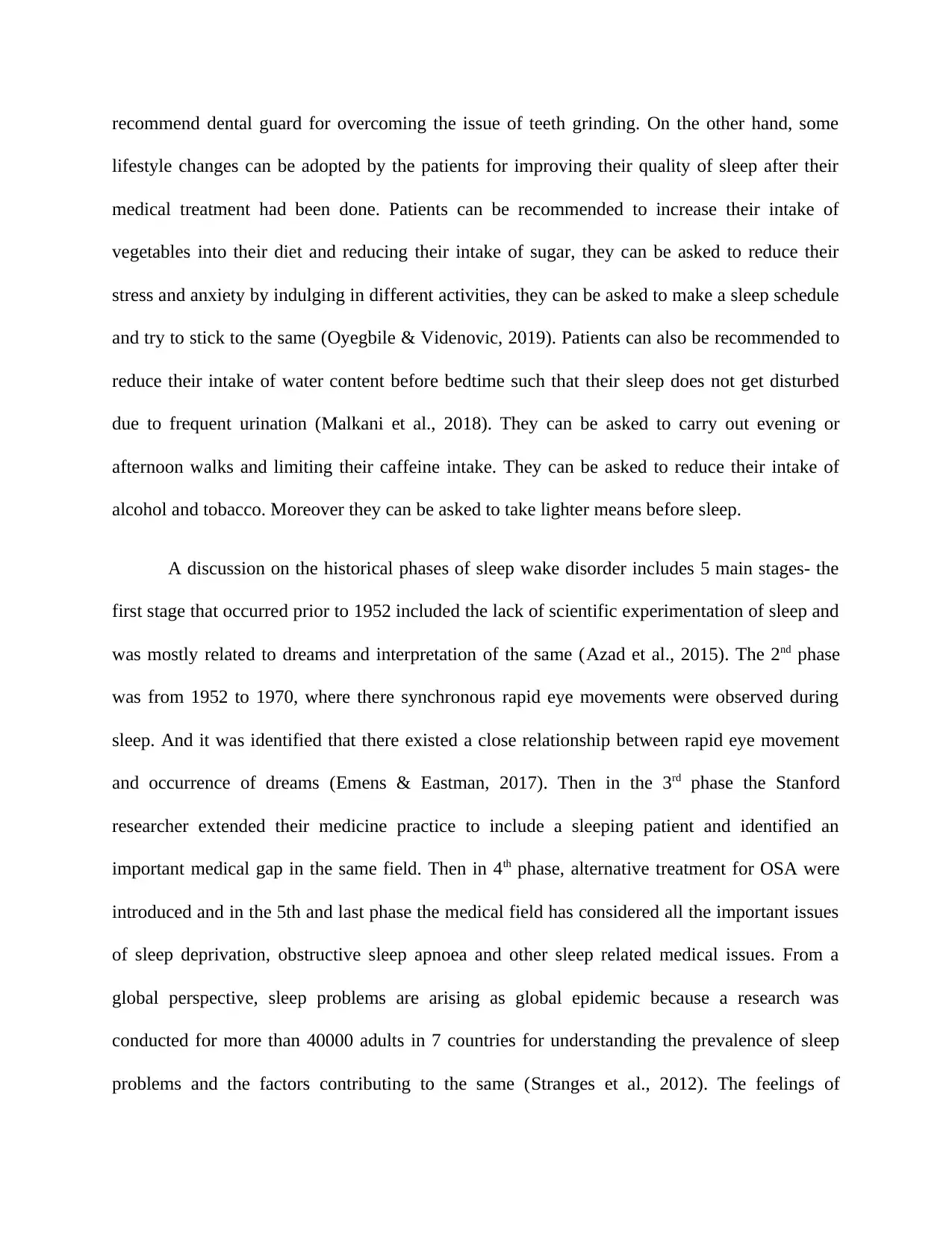
recommend dental guard for overcoming the issue of teeth grinding. On the other hand, some
lifestyle changes can be adopted by the patients for improving their quality of sleep after their
medical treatment had been done. Patients can be recommended to increase their intake of
vegetables into their diet and reducing their intake of sugar, they can be asked to reduce their
stress and anxiety by indulging in different activities, they can be asked to make a sleep schedule
and try to stick to the same (Oyegbile & Videnovic, 2019). Patients can also be recommended to
reduce their intake of water content before bedtime such that their sleep does not get disturbed
due to frequent urination (Malkani et al., 2018). They can be asked to carry out evening or
afternoon walks and limiting their caffeine intake. They can be asked to reduce their intake of
alcohol and tobacco. Moreover they can be asked to take lighter means before sleep.
A discussion on the historical phases of sleep wake disorder includes 5 main stages- the
first stage that occurred prior to 1952 included the lack of scientific experimentation of sleep and
was mostly related to dreams and interpretation of the same (Azad et al., 2015). The 2nd phase
was from 1952 to 1970, where there synchronous rapid eye movements were observed during
sleep. And it was identified that there existed a close relationship between rapid eye movement
and occurrence of dreams (Emens & Eastman, 2017). Then in the 3rd phase the Stanford
researcher extended their medicine practice to include a sleeping patient and identified an
important medical gap in the same field. Then in 4th phase, alternative treatment for OSA were
introduced and in the 5th and last phase the medical field has considered all the important issues
of sleep deprivation, obstructive sleep apnoea and other sleep related medical issues. From a
global perspective, sleep problems are arising as global epidemic because a research was
conducted for more than 40000 adults in 7 countries for understanding the prevalence of sleep
problems and the factors contributing to the same (Stranges et al., 2012). The feelings of
lifestyle changes can be adopted by the patients for improving their quality of sleep after their
medical treatment had been done. Patients can be recommended to increase their intake of
vegetables into their diet and reducing their intake of sugar, they can be asked to reduce their
stress and anxiety by indulging in different activities, they can be asked to make a sleep schedule
and try to stick to the same (Oyegbile & Videnovic, 2019). Patients can also be recommended to
reduce their intake of water content before bedtime such that their sleep does not get disturbed
due to frequent urination (Malkani et al., 2018). They can be asked to carry out evening or
afternoon walks and limiting their caffeine intake. They can be asked to reduce their intake of
alcohol and tobacco. Moreover they can be asked to take lighter means before sleep.
A discussion on the historical phases of sleep wake disorder includes 5 main stages- the
first stage that occurred prior to 1952 included the lack of scientific experimentation of sleep and
was mostly related to dreams and interpretation of the same (Azad et al., 2015). The 2nd phase
was from 1952 to 1970, where there synchronous rapid eye movements were observed during
sleep. And it was identified that there existed a close relationship between rapid eye movement
and occurrence of dreams (Emens & Eastman, 2017). Then in the 3rd phase the Stanford
researcher extended their medicine practice to include a sleeping patient and identified an
important medical gap in the same field. Then in 4th phase, alternative treatment for OSA were
introduced and in the 5th and last phase the medical field has considered all the important issues
of sleep deprivation, obstructive sleep apnoea and other sleep related medical issues. From a
global perspective, sleep problems are arising as global epidemic because a research was
conducted for more than 40000 adults in 7 countries for understanding the prevalence of sleep
problems and the factors contributing to the same (Stranges et al., 2012). The feelings of
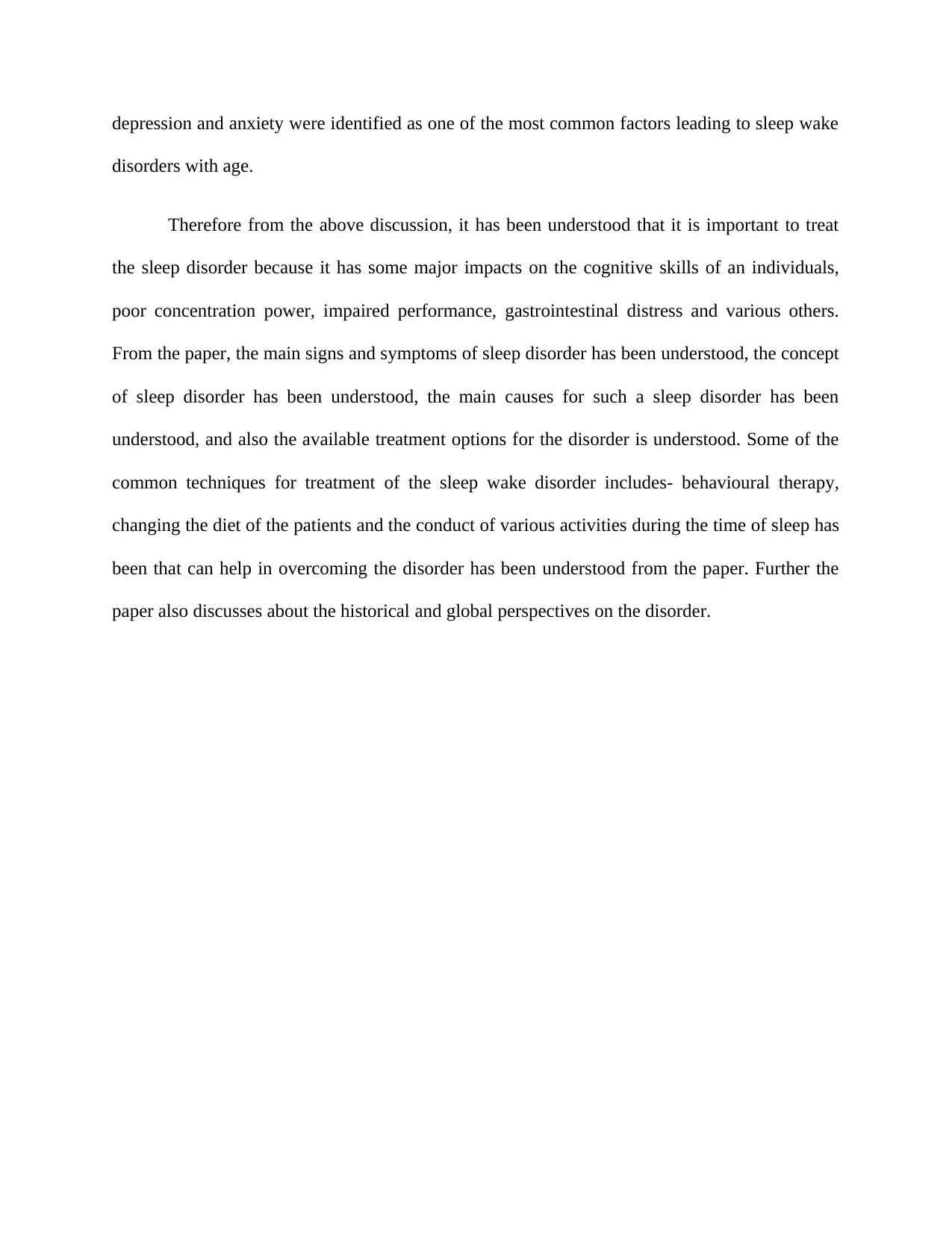
depression and anxiety were identified as one of the most common factors leading to sleep wake
disorders with age.
Therefore from the above discussion, it has been understood that it is important to treat
the sleep disorder because it has some major impacts on the cognitive skills of an individuals,
poor concentration power, impaired performance, gastrointestinal distress and various others.
From the paper, the main signs and symptoms of sleep disorder has been understood, the concept
of sleep disorder has been understood, the main causes for such a sleep disorder has been
understood, and also the available treatment options for the disorder is understood. Some of the
common techniques for treatment of the sleep wake disorder includes- behavioural therapy,
changing the diet of the patients and the conduct of various activities during the time of sleep has
been that can help in overcoming the disorder has been understood from the paper. Further the
paper also discusses about the historical and global perspectives on the disorder.
disorders with age.
Therefore from the above discussion, it has been understood that it is important to treat
the sleep disorder because it has some major impacts on the cognitive skills of an individuals,
poor concentration power, impaired performance, gastrointestinal distress and various others.
From the paper, the main signs and symptoms of sleep disorder has been understood, the concept
of sleep disorder has been understood, the main causes for such a sleep disorder has been
understood, and also the available treatment options for the disorder is understood. Some of the
common techniques for treatment of the sleep wake disorder includes- behavioural therapy,
changing the diet of the patients and the conduct of various activities during the time of sleep has
been that can help in overcoming the disorder has been understood from the paper. Further the
paper also discusses about the historical and global perspectives on the disorder.
⊘ This is a preview!⊘
Do you want full access?
Subscribe today to unlock all pages.

Trusted by 1+ million students worldwide
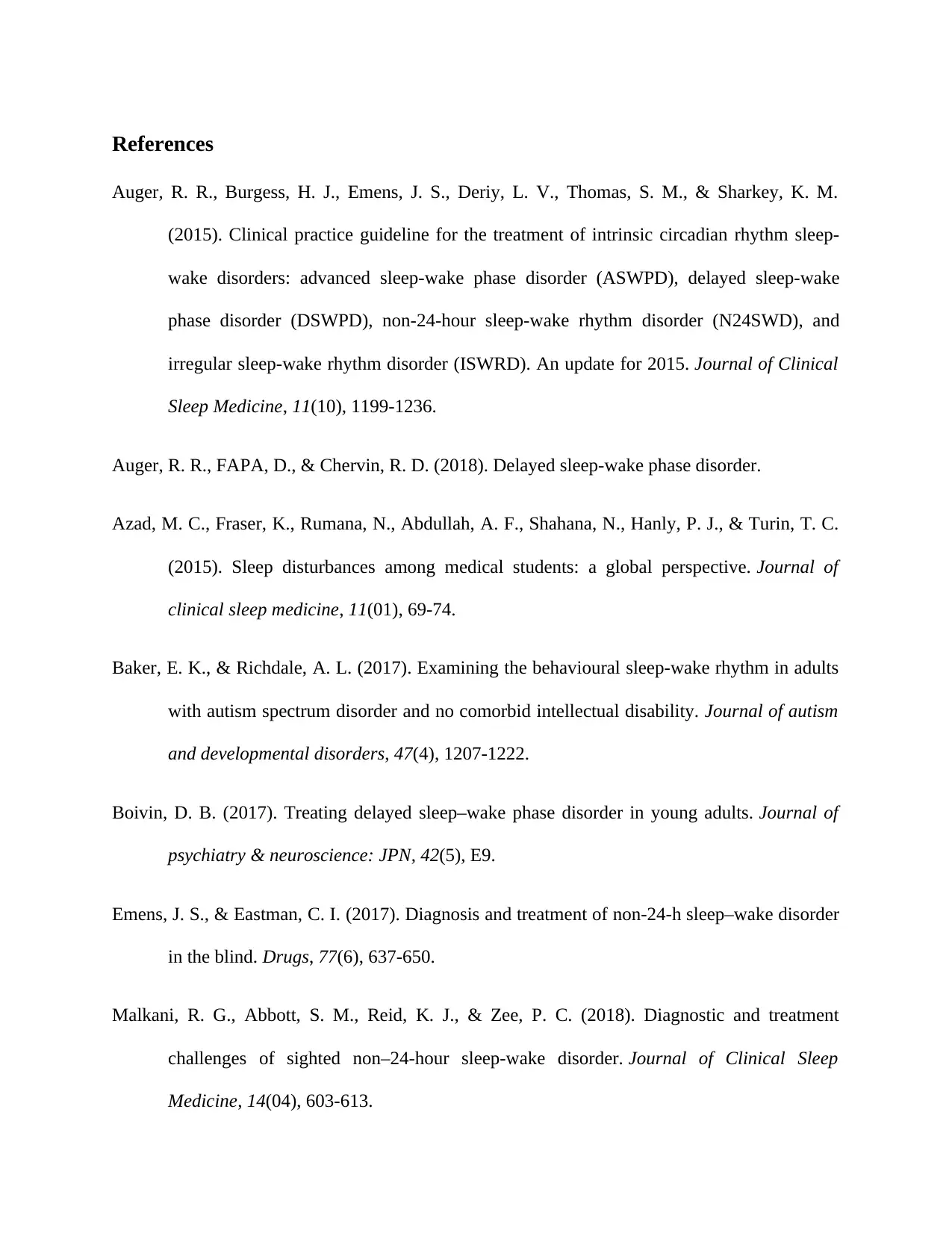
References
Auger, R. R., Burgess, H. J., Emens, J. S., Deriy, L. V., Thomas, S. M., & Sharkey, K. M.
(2015). Clinical practice guideline for the treatment of intrinsic circadian rhythm sleep-
wake disorders: advanced sleep-wake phase disorder (ASWPD), delayed sleep-wake
phase disorder (DSWPD), non-24-hour sleep-wake rhythm disorder (N24SWD), and
irregular sleep-wake rhythm disorder (ISWRD). An update for 2015. Journal of Clinical
Sleep Medicine, 11(10), 1199-1236.
Auger, R. R., FAPA, D., & Chervin, R. D. (2018). Delayed sleep-wake phase disorder.
Azad, M. C., Fraser, K., Rumana, N., Abdullah, A. F., Shahana, N., Hanly, P. J., & Turin, T. C.
(2015). Sleep disturbances among medical students: a global perspective. Journal of
clinical sleep medicine, 11(01), 69-74.
Baker, E. K., & Richdale, A. L. (2017). Examining the behavioural sleep-wake rhythm in adults
with autism spectrum disorder and no comorbid intellectual disability. Journal of autism
and developmental disorders, 47(4), 1207-1222.
Boivin, D. B. (2017). Treating delayed sleep–wake phase disorder in young adults. Journal of
psychiatry & neuroscience: JPN, 42(5), E9.
Emens, J. S., & Eastman, C. I. (2017). Diagnosis and treatment of non-24-h sleep–wake disorder
in the blind. Drugs, 77(6), 637-650.
Malkani, R. G., Abbott, S. M., Reid, K. J., & Zee, P. C. (2018). Diagnostic and treatment
challenges of sighted non–24-hour sleep-wake disorder. Journal of Clinical Sleep
Medicine, 14(04), 603-613.
Auger, R. R., Burgess, H. J., Emens, J. S., Deriy, L. V., Thomas, S. M., & Sharkey, K. M.
(2015). Clinical practice guideline for the treatment of intrinsic circadian rhythm sleep-
wake disorders: advanced sleep-wake phase disorder (ASWPD), delayed sleep-wake
phase disorder (DSWPD), non-24-hour sleep-wake rhythm disorder (N24SWD), and
irregular sleep-wake rhythm disorder (ISWRD). An update for 2015. Journal of Clinical
Sleep Medicine, 11(10), 1199-1236.
Auger, R. R., FAPA, D., & Chervin, R. D. (2018). Delayed sleep-wake phase disorder.
Azad, M. C., Fraser, K., Rumana, N., Abdullah, A. F., Shahana, N., Hanly, P. J., & Turin, T. C.
(2015). Sleep disturbances among medical students: a global perspective. Journal of
clinical sleep medicine, 11(01), 69-74.
Baker, E. K., & Richdale, A. L. (2017). Examining the behavioural sleep-wake rhythm in adults
with autism spectrum disorder and no comorbid intellectual disability. Journal of autism
and developmental disorders, 47(4), 1207-1222.
Boivin, D. B. (2017). Treating delayed sleep–wake phase disorder in young adults. Journal of
psychiatry & neuroscience: JPN, 42(5), E9.
Emens, J. S., & Eastman, C. I. (2017). Diagnosis and treatment of non-24-h sleep–wake disorder
in the blind. Drugs, 77(6), 637-650.
Malkani, R. G., Abbott, S. M., Reid, K. J., & Zee, P. C. (2018). Diagnostic and treatment
challenges of sighted non–24-hour sleep-wake disorder. Journal of Clinical Sleep
Medicine, 14(04), 603-613.
Paraphrase This Document
Need a fresh take? Get an instant paraphrase of this document with our AI Paraphraser
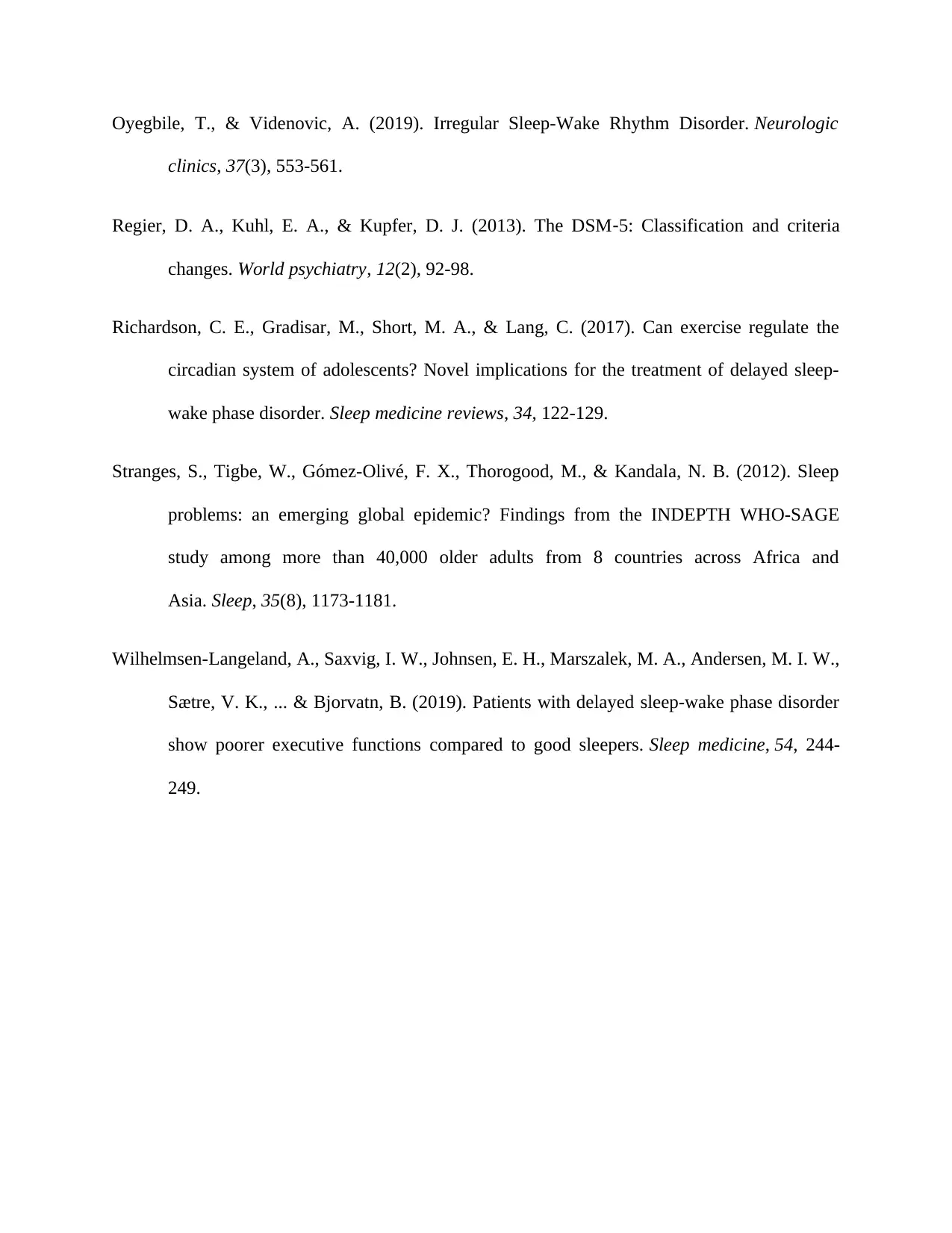
Oyegbile, T., & Videnovic, A. (2019). Irregular Sleep-Wake Rhythm Disorder. Neurologic
clinics, 37(3), 553-561.
Regier, D. A., Kuhl, E. A., & Kupfer, D. J. (2013). The DSM‐5: Classification and criteria
changes. World psychiatry, 12(2), 92-98.
Richardson, C. E., Gradisar, M., Short, M. A., & Lang, C. (2017). Can exercise regulate the
circadian system of adolescents? Novel implications for the treatment of delayed sleep-
wake phase disorder. Sleep medicine reviews, 34, 122-129.
Stranges, S., Tigbe, W., Gómez-Olivé, F. X., Thorogood, M., & Kandala, N. B. (2012). Sleep
problems: an emerging global epidemic? Findings from the INDEPTH WHO-SAGE
study among more than 40,000 older adults from 8 countries across Africa and
Asia. Sleep, 35(8), 1173-1181.
Wilhelmsen-Langeland, A., Saxvig, I. W., Johnsen, E. H., Marszalek, M. A., Andersen, M. I. W.,
Sætre, V. K., ... & Bjorvatn, B. (2019). Patients with delayed sleep-wake phase disorder
show poorer executive functions compared to good sleepers. Sleep medicine, 54, 244-
249.
clinics, 37(3), 553-561.
Regier, D. A., Kuhl, E. A., & Kupfer, D. J. (2013). The DSM‐5: Classification and criteria
changes. World psychiatry, 12(2), 92-98.
Richardson, C. E., Gradisar, M., Short, M. A., & Lang, C. (2017). Can exercise regulate the
circadian system of adolescents? Novel implications for the treatment of delayed sleep-
wake phase disorder. Sleep medicine reviews, 34, 122-129.
Stranges, S., Tigbe, W., Gómez-Olivé, F. X., Thorogood, M., & Kandala, N. B. (2012). Sleep
problems: an emerging global epidemic? Findings from the INDEPTH WHO-SAGE
study among more than 40,000 older adults from 8 countries across Africa and
Asia. Sleep, 35(8), 1173-1181.
Wilhelmsen-Langeland, A., Saxvig, I. W., Johnsen, E. H., Marszalek, M. A., Andersen, M. I. W.,
Sætre, V. K., ... & Bjorvatn, B. (2019). Patients with delayed sleep-wake phase disorder
show poorer executive functions compared to good sleepers. Sleep medicine, 54, 244-
249.
1 out of 8
Related Documents
Your All-in-One AI-Powered Toolkit for Academic Success.
+13062052269
info@desklib.com
Available 24*7 on WhatsApp / Email
![[object Object]](/_next/static/media/star-bottom.7253800d.svg)
Unlock your academic potential
Copyright © 2020–2026 A2Z Services. All Rights Reserved. Developed and managed by ZUCOL.





